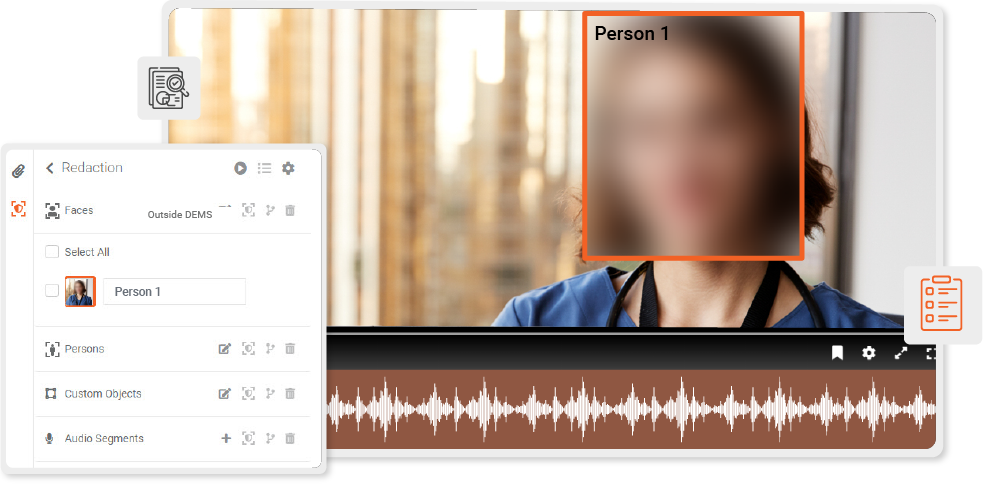Why Should You Have Online Password Protected Videos?
by Umer Ahmed, Last updated: November 19, 2025, Code:

In a world where information is as valuable as currency, protecting your online video content is no longer optional—it’s essential. Imagine you’ve spent weeks crafting a series of training videos or hours perfecting a marketing campaign video, only to find them widely accessible on the web. In addition, any data breach or exposure can have devastating financial consequences.
Your intellectual property, now free for anyone to use, is no longer a tool for growth but a liability for your brand. Losing control over your videos doesn’t just mean lost revenue; it can jeopardize your reputation, brand, and relationship with clients and audiences.
Password-protecting your online videos can be a game-changer. But what exactly does it solve, why does it matter, and how can you do it?
Understanding the Hidden Costs of Unprotected Video Content
According to IBM, the average cost of a data breach is USD 4.88M, a 10% increase from last year. Thus, taking every measure for your data and content security has become inevitable.
You know the value of your content, but do you know the cost of its exposure? Unprotected videos can damage your brand’s credibility, dilute its value, and even open up potential legal liabilities.
Consider the costly repercussions if training videos meant for employees' eyes only are leaked online or shared by competitors. That’s your expertise, your company’s unique positioning, now potentially being used to benefit others.
Imagine launching a premium course only to find it freely circulated on unauthorized channels. Or worse, an internal company meeting recording is unintentionally shared, disclosing confidential information. Without robust content security, these risks loom large.
Losing Control of Valuable Content
It’s 3 a.m., and the email pings: “Your content is available on an unauthorized site.” Instantly, your pulse quickens as you scramble to assess the damage. Unauthorized video access—from piracy, accidental leaks, or shared links—can be an ongoing nightmare for businesses relying on proprietary video content.
If this situation sounds familiar, you’re not alone. Inadequate security measures lead to a constant game of digital whack-a-mole.
The stakes are high. Here’s why losing control of your video content can hit your business where it hurts the most:
- Revenue Loss: Unauthorized sharing can directly impact profits, especially for educational institutions and content creators who rely on subscription-based revenue.
- Reputation Damage: When sensitive or proprietary information is leaked, it reflects poorly on the brand, raising questions about its dedication to security.
- Intellectual Property Theft: Content in which you’ve invested time, money, and creativity can be used by others without your consent, impacting competitive advantage and brand value.
But there is a solution—a straightforward, effective method for regaining control over your content and keeping it safe from prying eyes.
Why Password-Protected Videos Are Essential
Password protection provides a simple yet powerful solution to these complex challenges. Limiting access only to authorized viewers ensures that your videos remain private, secure, and valuable to the right audiences. Let’s break down the advantages of password-protected online videos and explore how they address the issues above.
Enhanced Content Security
Password-protected videos create an additional barrier that blocks unauthorized viewers. With security measures in place, you can decide precisely who has access to your content. This is crucial for industries that handle sensitive information, such as healthcare or finance, where privacy laws require stringent security.
Moreover, temporary video share options can add further flexibility, allowing viewers to access content only for limited periods, perfect for exclusive offers or training materials.Control Over Distribution
With password-protected content, you regain control over who sees what and when. No more worrying about shared links spiraling out of control. When password-protecting videos, you effectively gatekeep access, ensuring that only your intended audience benefits from your hard work.
Secure live streaming allows temporary, password-protected access to live events, providing a safe way to broadcast to specific audiences.Build Trust and Credibility
Any brand can win by demonstrating a commitment to security. Password-protecting videos assure your clients and partners that you value and protect their trust, especially when dealing with proprietary content.
Protect Intellectual Property
Video content is a valuable asset for any brand. Password protection prevents unauthorized sharing and keeps your intellectual property secure. From secure video distribution to secure online video libraries, implementing robust measures helps protect what makes your business unique.
Compliance and Risk Mitigation
Many organizations have legal obligations to secure sensitive information, especially in regulated industries like finance, healthcare, or education. For instance, educational institutions are legally bound to protect student information and cannot afford data leaks. Password protection and secure enterprise video CMS options effectively allow businesses to comply with these requirements.
Best Practices for Implementing Password-Protected Videos
While adding password protection to videos might sound simple, achieving optimal results involves a few key best practices:
Choose a Secure Platform
Whether you’re hosting an online course, a corporate training session, or exclusive marketing content, pick a platform that offers integrated security options. Platforms with secure enterprise video CMS functionalities ensure a robust level of protection and are essential for secure storage, access, and distribution.
Rotate Passwords Regularly
Don’t rely on a single password for extended periods. Rotate them frequently, especially if your content is subscription-based or accessible to multiple users. This minimizes the risk of unauthorized access if passwords are shared.
Use Two-Factor Authentication (2FA)
Where possible, enable 2FA. Adding this extra layer of security ensures that only those with both the password and the verified device can gain access.
Track Access and Activity
Platforms that track who accessed the video and when can help monitor engagement and detect any unusual activity patterns. Implementing analytics on your secure online video library can provide insights into how content is used and allow you to react swiftly if something seems off.
How Different Industries Benefit from Password-Protected Videos
Different industries have unique needs and challenges when it comes to video security. Password-protecting video content offers a versatile solution tailored to the specific requirements of each sector, providing control, privacy, and compliance. Let’s explore how password protection helps different industries:
Education
Educational institutions—from K-12 schools to universities and online learning platforms—rely heavily on video content to deliver lessons, tutorials, and training programs. Password protection helps educators ensure only enrolled students can access lecture materials, reinforcing course exclusivity and avoiding content leaks.
This is particularly important for institutions offering paid courses, as unauthorized distribution can directly impact revenue. Password-protected videos support academic integrity by ensuring assessments, live class recordings, and sensitive student discussions are only accessible to intended participants, maintaining a secure learning environment.
Corporate Training
Corporations use videos extensively for training and onboarding employees. Password protection helps HR teams and training managers confidently share content such as onboarding procedures, sensitive company policies, or proprietary training modules without worrying about them being leaked externally.
The corporate training videos often contain detailed insights into a company's operations and strategies, and unauthorized sharing could risk exposing competitive advantages. Password protection ensures that training content is only available to authorized personnel, making onboarding seamless while preserving privacy and brand security.
Additionally, password-protected content enables companies to maintain compliance with regulatory training requirements while controlling precisely who views the material.
Healthcare
The healthcare industry deals with extremely sensitive information, where privacy is a priority and a legal obligation under regulations like HIPAA (Health Insurance Portability and Accountability Act). Password-protected videos allow medical professionals to securely share training videos, patient care guidelines, and even recorded procedures within their teams, maintaining a high standard of confidentiality.
Patient education videos can also be password-protected to ensure that only the patients or their authorized caregivers have access, thus respecting patient privacy and complying with data protection laws. For telehealth purposes, password protection enables doctors to share follow-up consultation videos securely, offering patients peace of mind knowing their information is private.
Marketing
In marketing, password-protected videos control how, when, and by whom promotional content is accessed. Marketers often create product previews, campaign content, or exclusive announcements for select audiences, such as potential clients, partners, or stakeholders. Password protection ensures that these videos are only accessible to the intended audience, preventing premature leaks that could compromise marketing strategy.
Moreover, password protection allows marketers to offer exclusive content to high-value clients, increasing engagement and perceived value. Temporary video shares can create a sense of urgency, perfect for limited-time campaigns, exclusive sneak peeks, or pre-launch content that helps build buzz without sacrificing control.
Legal and Compliance
The legal industry frequently relies on video content for depositions, client interviews, or internal training. Password-protecting these videos ensures they are only available to authorized individuals, such as attorneys, clients, or other parties involved in a case. The legal implications of leaked videos can be severe, potentially impacting the outcome of a case or exposing sensitive client information.
Password protection helps law firms maintain control and confidentiality, comply with privacy regulations, and safeguard against breaches that could compromise client trust.
Finance
Financial institutions manage a wide range of content that requires strict security measures, including training videos, webinars on new regulations, and internal presentations. Password protection ensures that confidential information, such as procedural training or sensitive customer service updates, remains internal to the organization and does not fall into the wrong hands.
For clients, password-protected videos can also be used for personalized investment tutorials or updates, ensuring only the intended individual can view them. Maintaining data integrity and privacy through such measures is vital in a heavily regulated industry to comply with regulatory standards like GDPR or FINRA.
Government and Public Services
Government bodies and public service organizations also handle highly sensitive information that needs to be protected. Password-protected videos ensure that these materials are only accessible to relevant personnel, from internal training videos for police or fire department staff to informational content for public health initiatives.
This is especially critical when managing emergency response protocols, sensitive training content, or data-driven public initiatives where privacy and control are non-negotiable. Password protection not only secures this data but also ensures that the organizations meet compliance requirements related to confidentiality and public information dissemination.
Nonprofits
Nonprofit organizations often use video content for volunteer training, project updates, and donor communications. By password-protecting certain videos, nonprofits can ensure that internal training is only available to authorized volunteers while exclusive donor content is accessible only to key stakeholders.
This controlled access can help cultivate relationships with major donors by offering special behind-the-scenes content, project briefings, or live event recordings. This can give them a sense of exclusivity and value while safeguarding the integrity of ongoing projects.
By leveraging password-protected videos, each of these industries can effectively mitigate the risks associated with unauthorized access, protect intellectual property, and maintain audience trust. Ultimately, this protects revenue and data integrity and enhances brand reputation, helping organizations operate securely and efficiently in a digital-first world.
Conclusion: Why Password-Protecting Your Online Videos Matters
In today’s digital age, password protection is more than a precaution—it’s a necessity. By implementing password-protected online videos, you protect your business, intellectual property, and reputation from risks. From corporate training to education and marketing, every industry benefits from keeping video content secure and exclusive to the right viewers.
Password protection does more than limit access; it builds trust, supports compliance, and preserves the value of your content. So, as you evaluate your video security strategy, remember protecting your content isn’t just smart; it’s essential for long-term success.
People Also Ask
How do I password-protect a video on my website?
Many platforms, including Vimeo and Wistia, offer built-in password protection features. Check their guidelines to enable it on your hosted videos.
Is password protection enough for sensitive content?
While it’s effective, combining password protection with other security measures, such as two-factor authentication and IP restrictions, can enhance security.
Can I share password-protected videos temporarily?
Yes, temporary sharing options allow limited-time access, which is perfect for exclusive content or specific events.
What are the benefits of a secure online video library?
A secure library enables safe storage and controlled access to your video assets, making it easy to manage and distribute them.
Is secure live streaming possible for corporate events?
Absolutely. Many platforms offer secure live-streaming options that allow you to restrict viewership to specific individuals or groups.
Can I track who accessed my password-protected videos?
Many secure platforms provide analytics and access logs, allowing you to see who watched the content and when.
Why do companies use a secure enterprise video CMS?
An enterprise CMS allows large organizations to manage, store, and control access to video content across the company, ensuring compliance and security.
How often should I change video passwords?
Regularly changing passwords, particularly for widely accessible content, helps minimize the risk of unauthorized access.
What’s the difference between password protection and encryption?
Password protection limits access, while encryption secures the data, ensuring it can’t be accessed without the correct credentials.
Can password-protected videos support my brand’s reputation?
Yes, by demonstrating your commitment to security, password-protected videos build trust with your audience and show professionalism.
Jump to
You May Also Like
These Related Stories

Why Should You Have Online Videos Password Protected?

Best Secure Video Streaming Platforms in 2025


No Comments Yet
Let us know what you think